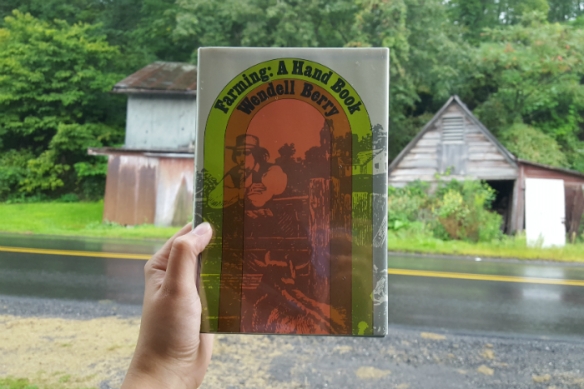
Harcourt Brace Jovanovich, Inc 1970. ISBN 0-15-130408-4
Summary, from inside flap:
Thinking, working, writing, Wendell Berry continues to grow, and his poetry, always more distilled and disciplined, always plainer; achieves more and more often an absolute clarity with a corresponding gain in resonance. Farming: A Hand Book, his fourth volume of poems, is at once the most homogeneous and the most varied he has produced; it is also the strongest.
This time almost all of the poems are pastoral, springing directly from Berry’s life in the part of Kentucky where he was born and where, with his wife and children, he now lives and farms. There are many lyrical or reflective poems, ranging from flawless quatrains such as “Sleep” and “To Know the Dark” to the strange, somewhat extended, yet economical “Meditation in the Spring Rain,” a venture unique among Berry’s poems. A somewhat protean personage called the Mad Farmer, written in his own voice (“The Contrariness of the Mad Farmer”), makes a number of memorable and entertaining experiences. “The Birth” is a narrative poem out of Kentucky which, in its vividness and colloquial ease, bears comparison with the New England narratives of Robert Frost; and a verse play, “The Bringer of Water,” complete and moving in its own right, is a kind of coda to Berry’s fine novel A Place on Earth.
Many people, and many different kinds, are coming to see Wendell Berry as being close to the heart of things, as expressing what America would like to believe that is, isn’t now, but perhaps has not lost all chance of becoming. There will be a wide and grateful public for the voice that speaks with such sanity and such moving eloquence in Farming: A Hand Book.
My thoughts:
What is with Wendell Berry’s books always having such hyperbolic covers? Each one sounds like the work of an uncaring, bullshitting, college student reviewer. (Myself aside, of course.) These summaries don’t reflect the actual nature of the poems inside. Farming: A Hand Book is a much more simple, yet powerful work that brings the Mad Farmer alive. The variety of poems show all aspects and natures the Mad Farmer has inside him.
The poem that struck my heart the most was “Awake at Night.” Often I am the same way the speaker is- restless and trying to reach for the healing that earth brings. This poem also coincides with the Mad Farmer archetype that Berry has created. “Awake at Night” shows the Mad Farmer as a restless man yearning for healing through earthly work. However, as the poem ends, the speaker has calmed and is ready for a night’s rest… only to prepare for the next day.
“The Wish to be Generous” would be the Mad Farmer’s mantra. This poem reveals how deep the Mad Farmer wants to share his world. He wants to understand the world around him so he can rest easy. He sees how beautiful the world is, how hard he works, and how brilliantly his life shines. The Mad Farmer is not truly contrary, this poem it showcases his adoration for his humble, hardworking existence. “The Wish to be Generous” paints the Mad Farmer as salt of the Earth, a servant of the world around him, ready and willing to return to his roots.
A last poem, “The Silence,” is an example of the actual “madness” of the Mad Farmer. You see- the Mad Farmer is not the Mad Farmer because he is angry, but because he lives so wholly for the world. This poem shows his struggle with the actual work he does for himself. The work he does for himself is how he deals with his actual self. The Mad Farmer, in perfection, has no self- he would be one with the land. This poem is how the Mad Farmer is getting past all of it and being embraced by the land. I think this poem ties in well with “The Wish to be Generous.”
I know these are only three poems among many, but they are the ones that stood out to me when it comes to defining who the Mad Farmer is. The pompous summary on the flap does not describe how Farming: A Hand Book is a guide to understanding the Mad Farmer. There is no frivolity in the poems themselves, but the simple song of a man in love with the earth.